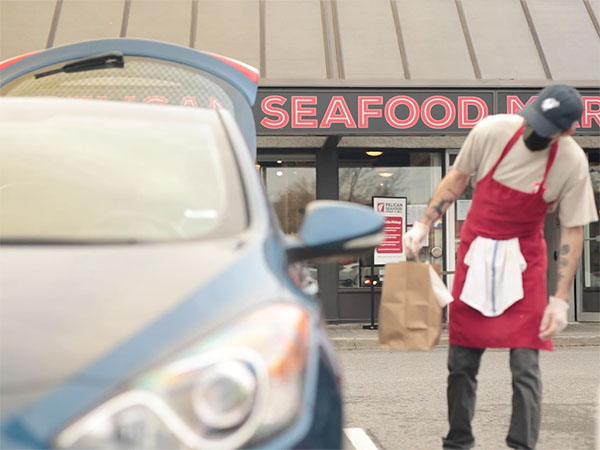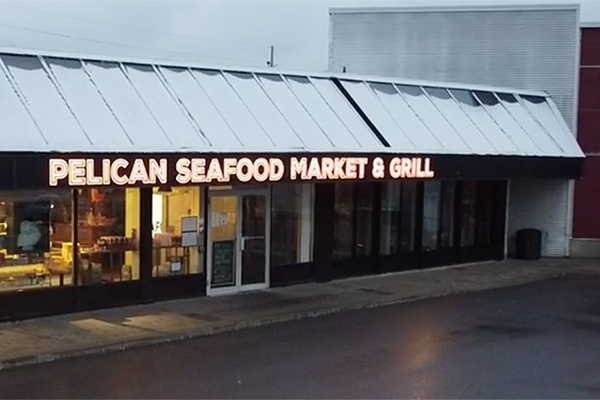Nestled in a strip mall on Bank Street just south of Billings Bridge is Pelican Seafood Market and Grill: a combined seafood market and restaurant that stays busy despite falling temperatures, restaurant closures, and fear of COVID-19.
While many Ottawa restaurants struggle to stay afloat amidst closures and falling profits due to COVID-19, Pelican Seafood has managed to not only survive the pandemic, but thrive during these troubling times. It is at the forefront of adapting to succeed in an industry forced by novel coronavirus to change drastically.
Pelican Seafood was initially established as a seafood market in 1978, specializing in selling Canadian seafood in Ottawa. The shop offers a wide variety of fresh fish and seafood, as well as frozen seafood and their own line of seafood-related grocery products. In 1996, the owners decided to also open a restaurant where they could prepare and serve their products. Now, the business has become a local staple.
Navigating the pandemic voyage
Jim Foster is an owner of Pelican Seafood, and has been a part of the business since 1986. He says that when the pandemic first hit, he was forced to lay off 35 staff members in order to cut costs, and before they could start to make changes to their model.
“We worked like thieves,” says Foster. “I personally worked twenty-three days straight for that first part, just re-engineering the market and takeout.”
Adriana Ellis was working as assistant manager at Pelican Seafood’s restaurant when the pandemic hit, and now works as a part-time server. She said that all the staff who were laid off because of the COVID-19 crises were rehired.
“I was laid off for about three months, and then they brought me back on working part time with takeout,” she says. “In fact, we’ve actually had to do some hiring, which is unreal.”
Ellis also says that since the pandemic began, Pelican Seafood’s hot food takeout initiative has grown from a feature of their fishery to a third staple of their business.
“It used to just be the fishery would do it [takeout]. Now, as busy as it is, [takeout] is its own little realm,” she said. “They’ve actually had to add a whole other line to the kitchen, just to keep up.”
Foster says that their online platform, which they implemented during Christmas time last year, allowed them to fulfill orders online for curb-side pickup and partially re-open their kitchens the past summer. He says that at the height of the initial lockdown, they would be preparing more than 100 meals each day for takeout.

Pelican Seafood split the market and restaurant so that they each had their own entrance, allowing clients to distance themselves more easily and only enter the business of their choice. Their dining room is fully sanitized every half hour, and adheres to the new last call laws. They also re-organized the seating space in the dining room to allow for social distancing and privacy. Before the pandemic, Pelican Seafood could sit 80 patrons; now they can safely seat up to 50.
“We would have already started the [renovation] process if it weren’t for COVID,” says Foster, explaining how their restaurant was already due for an upgrade. “People really like little booths and corners, and the ones provided by the barriers were really popular.”
Foster also said that they poured a lot of money into digital advertising during the pandemic.
“The truth is, people are sitting at home and they’re on the computer, so we were capturing long-term customers throughout May, April, and June and we continue to do so,” he says.
Trexity: A new hope
As part of their transition to the new reality of the restaurant business, Pelican Seafood partnered with a company called Trexity in order to fulfill same-day deliveries of takeout and seafood.
Alok Ahuja is the chief executive officer and founder of Trexity, the Ottawa-based startup company that he says is helping many local businesses stay open by offering faster, more transparent ways to get their product to customers.
“We are a last-mile logistics platform,” said Ahuja. “Our goal is to help businesses and merchants master same-day level delivery.”
Ahuja says Trexity partners with retail and grocery businesses so they can get their products to customers faster. The startup offers all the modern features associated with delivery, such as real-time order tracking on a map, and a driver profile letting customers know what make, model, and colour of car their purchase will arrive in.
Ahuja said that while their company is about two years old, the COVID-19 pandemic multiplied their business tenfold.
“People started to realize that as they were forced to close their storefronts, they had to pivot,” says Ahuja. “People started to gravitate towards Trexity because we offer a service they never had, or never thought to incorporate into their business.”
Ahuja says that this year, Trexity will help Pelican Seafood uphold Pelican Seafood’s tradition of serving up to 100 lobster dinners on the new year.

“It’s a staple with Pelican. Every year, you get your New Year’s Eve lobster dinner,” says Ahuja. “We’re ramping up to do some high volume deliveries for them on the 31st and we’re planning to get that done. It’s exciting for us. It’s exciting for all of us.”
Ellis says that Pelican Seafood is excited to be able to uphold tradition this year, and expects the kitchen to be fully staffed on New Year’s Eve.
Foster and Ellis both say that they attribute the success of Pelican Seafood during these trying times to their hard workers, quality seafood, and the strong base of long term customers that they hope to keep growing.
